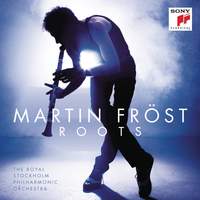Interview,
Martin Fröst - Roots
 Swedish clarinettist Martin Fröst has a history of eclecticism - his previous albums have often explored facets of the relationship his instrument has to the folk traditions of Central Europe, and the cross-pollination between this music and what we think of as the conventional classical world.
Swedish clarinettist Martin Fröst has a history of eclecticism - his previous albums have often explored facets of the relationship his instrument has to the folk traditions of Central Europe, and the cross-pollination between this music and what we think of as the conventional classical world.
His latest release takes this principle further, with pieces drawn from almost two thousand years of Western and non-Western musical development. Composers range from the second-century Mesomedes of Crete, via Hildegard of Bingen, the little-known Finn Bernhard Crusell and Astor Piazzolla, right up to contemporary Latvian composer Georgs Pelēcis. Influences from Romanian folk music, klezmer and the blues all go into the mix too!
I spoke to Martin about how he tied together this dizzying mix of different styles into one musical journey...
With a programme as diverse as this, and also given the time constraints of a single-CD album, isn’t there a risk of sacrificing coherence for the sake of variety? The Klezmer Dance and Piazzolla’s La muerte del ángel in particular seem rather isolated, short representations of their respective traditions.
I spent a lot of time putting together the programme – both for live performance and the album – to work out a sequence that I thought worked best. I have tried to put together music related to each other in different kinds of ways – through their keys, their rhythms and melodic ideas – but allowing for elements of surprise. The idea of coupling things that at first may appear to be completely alien from each other turns me on. When things all of a sudden – sometimes almost unnoticed – merge into something completely different.
Where do you feel the line falls between reinterpreting pieces in a fresh, modern light (as clearly applies to the Telemann) and using them as the basis for the creation of something essentially new (as must surely be necessary with the second-century Greek melodies)?
All the music that is performed on the album - apart from the Crusell – is a kind of reincarnation of the original, whether it be a transcription, variation or a new setting that has come about through an improvisation. In the Greek melodies and the Hildegard of Bingen it s a fusion between two types of old schools and it is surprising how well they work alongside each other. Elsewhere on the programme I wanted to remind myself how improvisation has played such an important part in the evolution of music – allowing it to change and constantly be fresh in any given era. That’s how I also came up with new playing techniques on this recording – for instance simultaneous singing / playing through a 3 step breathing technique (track 16) and beatbox playing (track 18).
Isn’t there a danger, when interpreting very early and incompletely-documented repertoire such as the Mesomedes and indeed the chants of Hildegard of Bingen, that our modern ears and minds can misunderstand how the music works, and thus misrepresent it in performance?
This is an interesting question and one that is a main idea behind the selection of all the music on the album - I believe this question not only refers to Greek chants or Hildegard of Bingen but indeed the whole history of music. We are formed by our own times and influenced by centuries of music which we can only imagine how it might have sounded originally. But our ears are “new ears” and not old ones. Take just one comparison to art – the Elgin Marbles – we know and love them in our times for their majestic simplicity. But recently it came to light that they were originally painted. That makes our perception and perhaps also our appreciation of them completely different and how do we know how they were perceived or appreciated when they were newly built?
In the light of this we can start to understand what, at least for me, looks like a paradox. Namely that when we sit and think about what has influenced us from the past we might not think how the past is influenced by us.
Several recent classical releases seem to have played up the clarinet’s link to Central and Eastern European music, in a way that is relatively new. Do you think this is mere coincidence, or part of a trend towards a new view of the instrument’s heritage?
On three of my recent albums (Fröst and Friends, Dance of the Black Pipes and the new CD Roots) I have been exploring central and Eastern European music particularly inspired by Brahms and Klezmer. I think that an exploration of this music opens up the possibility for the clarinet and the music lends itself so beautifully and naturally to the instrument. So whether it is a new trend or coincidence I can’t say but I think it is important to keep presenting music in new ways, so long as it feels natural.
Roots is released on Sony on Friday 29th January.
Available Formats: CD, MP3, FLAC, Hi-Res FLAC



